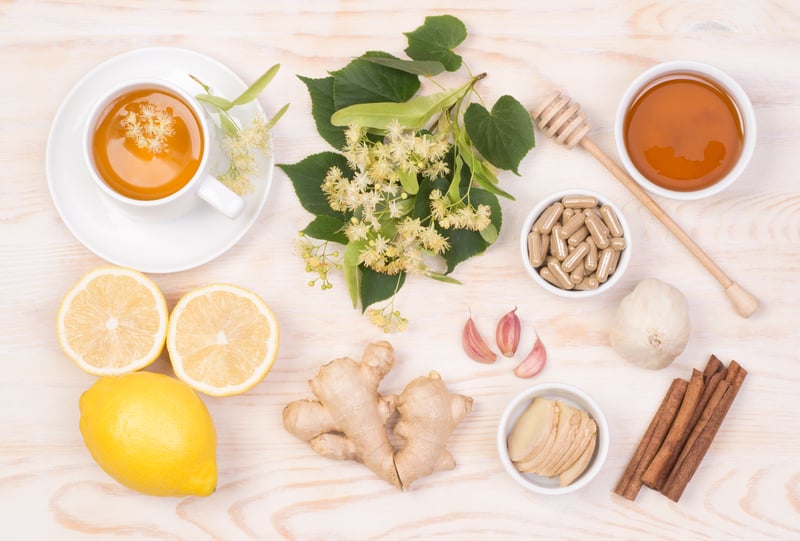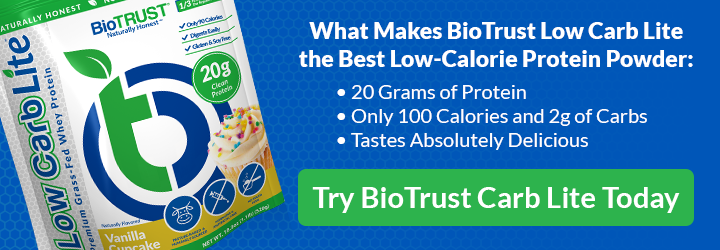Flu Diet: These 8 Foods Help Fight the Flu

Even if you take increased precautions to prevent getting sick, when winter season comes, so does flu season. The flu comes around each year, and although the flu viruses circulate year-round, most years, flu activity peaks between December and February with activity lasting as late as May. If you have ever had the flu, you know that it can be downright miserable. So, if you find yourself suffering, you likely want to find foods that help fight the flu.
We all know that what you eat directly affects how your body can function. So when it comes to what food to eat when you’re feeling rotten, you have probably heard the centuries-old saying, “feed a cold, starve a fever.” This idea originated in the Middle Ages when it was believed that illnesses caused by low temperatures needed to be fueled, and illnesses caused by high temperatures needed to be cooled.
Nowadays, due to years of research, it has been determined that the only universal treatment for colds and flu is plenty of rest and fluids. But you can also support your immune system during sickness with proper nutrition through a good flu diet.
These 8 Foods Help Fight the Flu
Although eating may be the last thing you feel like doing when sick with influenza, your body needs fuel to boost the immune system. Certain foods are particularly high in vitamins, minerals, and other nutrients that help support a healthy immune response or ease some of your nastiest symptoms. Here are the best eight flu diet foods:
1. Chicken Soup
Few foods are as comforting as soup when you’re sick, especially good old chicken soup. A hearty chicken soup is not only good for the soul but is packed with vitamins, minerals, protein, and some fat. The warm liquid from the broth may help improve upper respiratory tract symptoms by providing hydration and stimulating nasal clearance. The broth and vegetables like carrots, celery, and onions, which contain vitamins A, C, and other antioxidants, have been shown to help support a robust immune response and fight off viruses.
2. Yogurt
Yogurt’s smooth texture can feel very soothing on a sore throat when sick. Even better, the live cultures have probiotics and immunity-boosting properties since 70% of your immune system is housed in your gut. The good bacteria found in yogurt can help support gut balance and may fight off infection.
3. Garlic
This full-flavor “stinking rose” also has antiseptic, antibacterial, and antifungal agents. This means it may help the body fight off infections that are making you sick.
4. Berries
Berries, such as strawberries, raspberries, and blueberries, are loaded with health benefits. In particular, anthocyanins make berries excellent foods to eat when sick because they appear to have strong anti-inflammatory, antiviral, and immune-boosting effects.
5. Honey
Honey may have potent antibacterial effects because of its high content of antimicrobial compounds. Honey also contains antioxidants to help boost the immune system and tame coughing by soothing the back of the throat and breaking up mucus. Manuka honey, in particular, has increased antibacterial properties, which set it apart from traditional honey. This is because Manuka honey contains methylglyoxal, which may kill bacteria by destroying key bacterial proteins.
6. Ginger
Ginger is most well-known for relieving stomachache and nausea. Some suggest it may also fight inflammation and even ease congestion as well as stimulate circulation in the body. Ginger also provides an active compound called gingerol, which is known for its antimicrobial properties.
7. Leafy Greens
Leafy greens like spinach and kale can help boost your immune system when you have the flu. They provide both vitamin C and vitamin E, immune-enhancing nutrients that may reduce the duration of illness.
8. Protein
Ensuring your body is supplied with enough protein is always important, but it becomes increasingly critical when sick. Protein not only will help fight fatigue, but it also helps the body build antibodies to fight infection, so the body can recover. If feeling too ill to eat, consuming easily digestible whey protein powder is an excellent way to get much-needed nutrients into the body. Compared to other protein sources, whey protein is unique in its ability to help optimize immune function. It also appears to be a natural detoxifier, helping to eliminate potentially harmful toxins.
What About the Stomach Flu?
Despite being two very different illnesses, the name alone can cause some mix-up. Since symptoms for these two “flus” vary, the foods to eat to best treat them differ as well. As stated in the name, the stomach flu causes distress to the stomach characterized by diarrhea, cramps, nausea, vomiting, and fever. In fact, the stomach flu is just a popular name for an illness called gastroenteritis, meaning inflammation in the gastrointestinal tract, which is usually caused by a virus. This is different from the seasonal flu, which is a virus in the upper respiratory system resulting in chills, muscle aches, cough, congestion, runny nose, headaches, and fatigue.
Nevertheless, if suffering from the stomach flu or gastroenteritis, the BRAT diet may be best. The BRAT diet is often recommended when treating an upset stomach. The diet consists of bananas, rice, applesauce, and toast. These foods are high in carbs and low in fiber, making them easy on the stomach while giving the body the nutrition it needs.
Why Hydration is Key
Above all, the number one “food” that helps fight the flu is water/staying hydrated. When you are sick with a fever, water is being drained from the body and you are using more energy. Similarly, nausea, in addition to vomiting and diarrhea, during the stomach flu can drain your body of vital fluid and electrolytes. Drinking enough water each day is crucial for many reasons, but especially when feeling ill.
The U.S. National Academies of Sciences, Engineering, and Medicine has determined that an adequate daily fluid intake is about 15.5 cups of fluids a day for men and about 11.5 cups for women. Staying properly hydrated helps balance electrolytes and filters waste from the body.
Plus, loading up on fluids will help reduce headaches, relieve flu symptoms, and strengthen the body’s immune response.
Flu Diet Foods to Avoid
While it is important to know what foods to eat when sick with the flu, it is equally important to know what food to avoid. Unlike the foods listed above, some foods can make your symptoms worse and leave you feeling drained. Flu diet foods to avoid include:
1. Greasy Foods
If you are feeling sick, it may be tempting to find comfort in some of your favorite guilty pleasures. However, it is best to stick to the non-greasy variety. Greasy and fried foods contain high amounts of pro-inflammatory fats, which can spike inflammation in the body. Plus, anything soaked in oil is harder to digest and will probably make you feel even more crummy.
2. Alcohol
Drinking alcohol can lead to dehydration, which can be very dangerous when sick. In addition, alcohol might interact with over-the-counter or prescription medications, so it is probably best to avoid these two until you’re feeling better.
3. Caffeine
Much like alcohol, caffeine should be avoided when feeling ill. Caffeine is considered a mild diuretic, so consumption can also lead to dehydration.
Whether you are sick with the flu or just feeling downright icky, there are some natural ways to ease the symptoms. Hydration is key, and although there is no need to push your body if you don’t feel like eating, a well-nourished immune system can better fight infections so you can feel better and recover faster.






 7 Signs Your Body is Seriously Low on Collagen (not just wrinkles)
7 Signs Your Body is Seriously Low on Collagen (not just wrinkles) Health Expert: "Turmeric Doesn't Work (unless...)"
Health Expert: "Turmeric Doesn't Work (unless...)" 3 Warning Signs Your Probiotic Supplement is a Total Waste
3 Warning Signs Your Probiotic Supplement is a Total Waste

